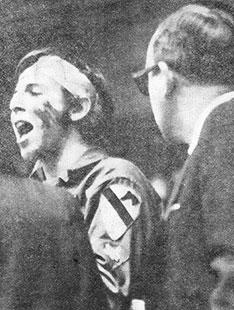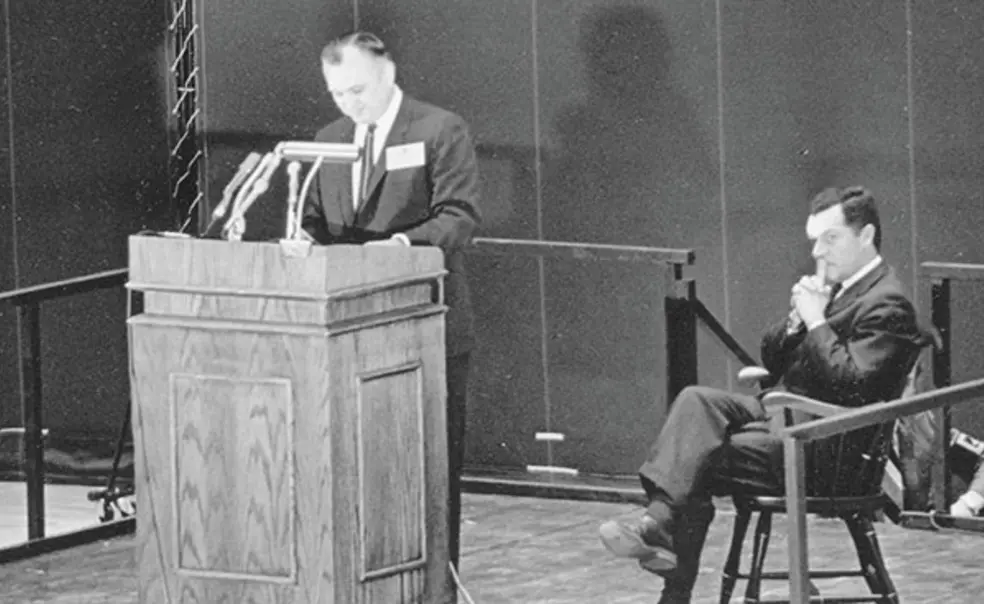
Hickel headlined a conference on “Ecology and Politics in America’s Environmental Crisis,” but his speech, in which he asserted that “environmental concerns must be prominent in resource development,” was overwhelmed by student anger at the Vietnam War. While most of his listeners in Jadwin Gymnasium kept their views to themselves, a group of 75 hecklers unleashed a barrage of jibes, chants, and cries.
Hickel tried to make himself heard above the din, which included defiant shouts of “Today’s pigs, tomorrow’s bacon! Nixon and Hickel better start shaking!” President Robert Goheen ’40 *48, who sat nearby, finally intervened, warning that any further disruptive behavior would be punished. The cacophony continued, and though Hickel soldiered on, Goheen felt compelled to cancel the question-and-answer session that should have followed.
Thirteen hecklers, strongly backed by Students for a Democratic Society (SDS), were brought before the Judicial Committee of the newly formed Council of the Princeton University Community, and after five days of contentious public hearings, a 24-page “verdict” was delivered. One student was acquitted, nine were placed on disciplinary probation, and three were suspended.
READ MORE Landon Y. Jones ’66’s in-depth coverage of the Hickel heckle and the ensuing trial
For Goheen, speaking to the Judicial Committee, the tactics of the hecklers “bring us no nearer an ending of the Vietnam war. ... They demean the whole idea of academic freedom. They seriously undercut the ability of the University community to govern itself.” For others, including the editorial leadership of The Daily Princetonian, because SDS “protested policies and political figures who deserve to be protested, its effects were far more good than bad, and the demonstration was justified.”
As for Hickel, he was fired by Nixon in the fall, in part for pressing the president to listen to young Americans.
John S. Weeren is founding director of Princeton Writes and a former assistant University archivist.












3 Responses
Richard M. Waugaman ’70
3 Years AgoPresident Goheen Advised Us Against Activism
Re: The Hickle Heckle. Yes, I recall it well. It’s relevant to add that when President Goheen welcomed our Class of 1970 to Princeton, he explained that we’d be too busy with our studies to get involved in any political activism. He gradually changed his mind. Where would be today without the activism that helped end the Vietnam War, and helped prevent Trump from being reelected in 2020 and further destroying our democracy?
If you’re wondering, I didn’t personally heckle Hickel, though the phrase itself is most inviting.
Alan G. Kirk II ’50
7 Years AgoRecalling Hickel’s Speech
Re “The Hickel Heckle” (That Was Then, March 7): In 1970 I was a personal assistant to Secretary of Interior Walter Hickel. I had left the comfortable life of Philadelphia’s suburban Main Line to move my wife, four children, and three dogs to join the solicitor’s office at Interior, and in late 1969 I was asked by the secretary to move to his capacious office area to help in organization and management of his responsibilities. This was a fascinating job, especially for an Easterner in a huge Westerner Cabinet post.
When the secretary was invited to speak at Princeton March 5, 1970, I was asked to prepare a draft of his remarks. I was aided by another Tiger a bit younger than I (whose name eludes me now). We wrote a graphic tribute to the environment, a strong cry for cleaner rivers and air. We flew up to Princeton that afternoon in a tiny plane, and “the rest is history.” We were greeted by a mob of screaming undergrads dressed in Indian headdress and with painted faces.
The irony of this confrontation is that the speech, which few could hear, was what the audience would have marveled at as a forceful and quite eloquent cry for environmental protection. A sad day in Princeton history.
Robert D. Bolgard ’57
7 Years AgoRecalling Hickel’s Speech
I attended the speech by Interior Secretary Hickel in 1970. It took place during the Alaskan oil boom, so the students (and I) were just as concerned about Hickel’s possible ties to the oil industry, begun when he was governor of Alaska, as they were about the Vietnam War. There were numerous shouts of “What about the oil, Wally?”
As John S. Weeren mentions in his article, Hickel was actually a proponent of responsible development of Alaskan and other U.S. resources, keeping in mind ecological and environmental impacts. I believe that is another reason that Nixon fired him, and why I think many of the student protests were unjustified.